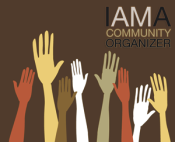says,
In an era when fashionable thinkers claim that race is just a social construct, Obama's subtitle [to "Dreams of my father: a story of race and inheritance,"] is subversive."
Note the phrase "claim that race is just a social construct". You see, the American Conservative does NOT believe that "race" is "just a social concept"! Black thinkers insist upon using the word race in the belief that it has a legitimate sociological meaning. But, every time we say that we are of "the Black race" or otherwise use the word, we validate and legitimate the conservative white supremacist idea that "race" is biological. Of course, to them the word "race" is both their badge of superiority and ours of inferiority, which they use ubiquitously as a substitute for the "N" word. Instead of challenging them, we are providing linguistic cover to white supremacy by continuing to use the word "race" ourselves.
If instead we Blacks used the term "systemic denigration, subjugation and exploitation of African-Americans based on our skin color and ethnicity, then whites would be forced to either describe functionally what "race" really consists of sociologically and politically (which would educate the public) or they would have to acknowledge that they really ARE asserting the theory that Blacks are fundamentally different biologically. Because we have never abandoned the "race" word ourselves, we have never forced whites to take a position on the matter of whether "race", in their eyes, is biological or social and political.
This is why the most powerful thing that Blacks can do now rhetorically and politically is to demand that whites stop using the word "race," to insist that the word is an anti-scientific fantasy and an attack on Black's equal humanity. This would force whites to either stop using the word or to acknowledge that they don't believe that Blacks have equal biological humanity in the first place.
If you want to flush the "racists" out of the closet, just insist that they stop using the "race". The arguments that will ensue will be very enlightening. Whites who admittedly don't believe in the political concept of race will have to acknowledge that the are referring to the discredited and libelous biological concept of race, which holds that Blacks are fundamentally different and inferior biologically.
Then, we'll have them on the run politically, trapped into a public relations corner from which they will not be able to extricate themselves. We will demand proof of these fundamental differences, and they will have to admit that no sufficient proof exists, and that the real basis for their beliefs is their learned ideation about Blacks, based on culture, not science.
The American Conservative further says,
Although the biracial Obama is frequently lumped with the multiracial golfer Tiger Woods as evidence of the socially healing power of interracial marriage, their attitudes are quite different.
American Conservative
This sentence is ludicrous, if you think about it. When they say that Obama is "biracial" are they saying that, politically, he belongs both to the oppressor group and the oppressed? When, in the history of America, have half-Black people been permitted to join the oppressor group? Instead, what they are saying is that BIOLOGICAL "race" does exist and Barack Obama is biologically half from one "race" and half from another.
The only way to flush out the biological concept of race from the American psyche is to stop using the word altogether and demand that whites stop using it. The use of the word itself is a part of white privilege used to maintain whites' belief in their own inherent biological difference and superiority. Strip them of the "race" word and you strip them naked.
Returning to Barack Obama's speech, how could this speech have been about "race" if Obama never mentioned the most fundamental fact about "race": that "race" does not exist as a biological fact, but only as a sociological and political force. If you give a speech to adults about Santa Claus, should you at some point state, at least in passing, that Santa Claus is a myth, a fantasy passed on to children for their amusement and imagination? Obama never even mentioned that there is a debate as to whether race is biological or political. Obama never said that to America, so his speech really was not about the concept of "race".
Now, if Obama had said his speech was about "systemic denigration, subjugation and exploitation of African-Americans based on our skin color and ethnicity", that would have been a more accurate description of the political concept of "race" and quite a bit more challenging. If he had added that his speech was about "color-aroused ideation, emotion and behavior" (otherwise known as "racism") in the presidential contest, then that, too, would have taught Americans much that they don't. (I agree that introducing all of these new concepts in the context of a presidential speech would have been much more risky than the speech he actually made, and so I am not saying that he SHOULD have done so.)
Do Blacks have to give up the "race" word and describe the political force differently if we are to have any hope that whites will give up the belief in the biological concept of "race." Can Blacks really achieve our goals in America while still enabling whites in their belief that they are fundamentally biologically different and superior? For so long as we are wedded to the word "race" as if it were our first Snoopy blanket, whites can and will continue to use the word as a subtler but ubiquitous substitute for the "N" word.


